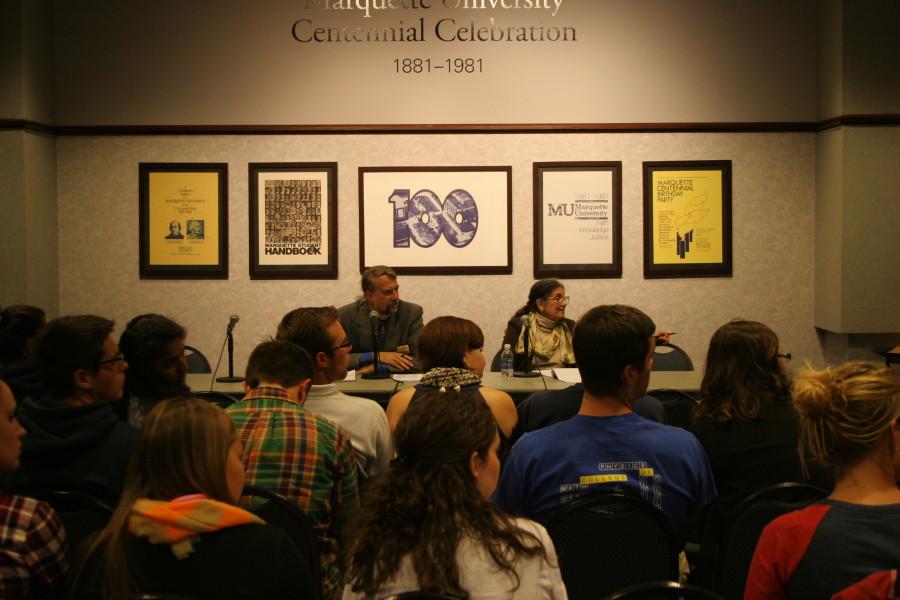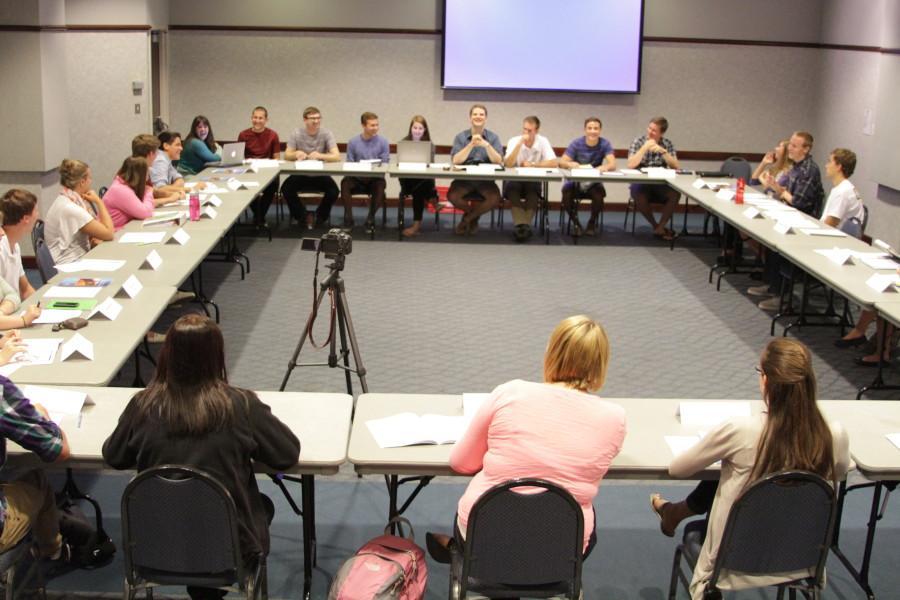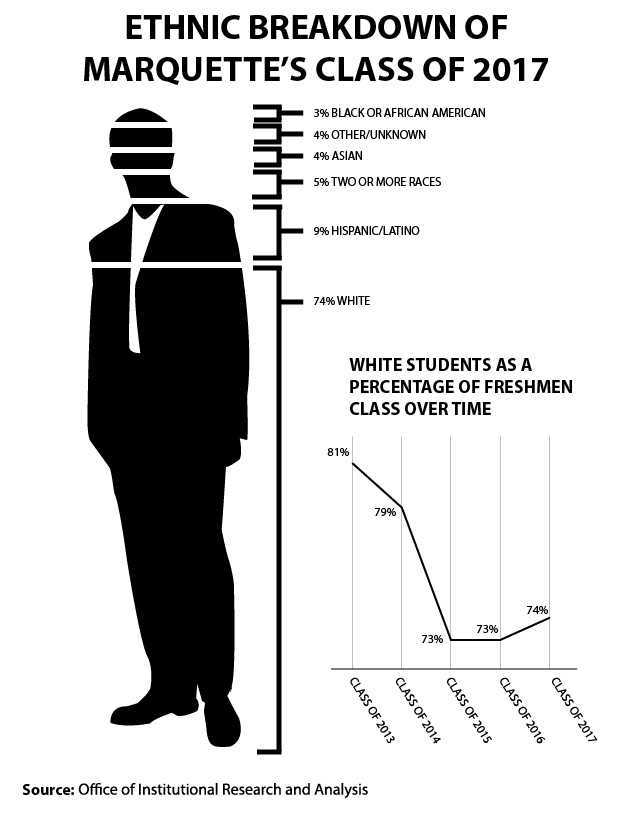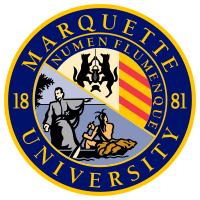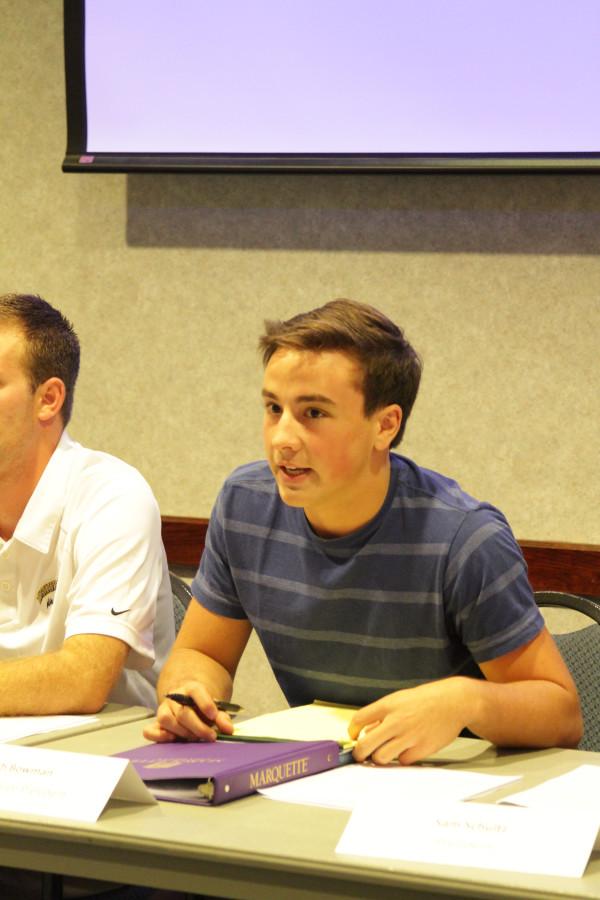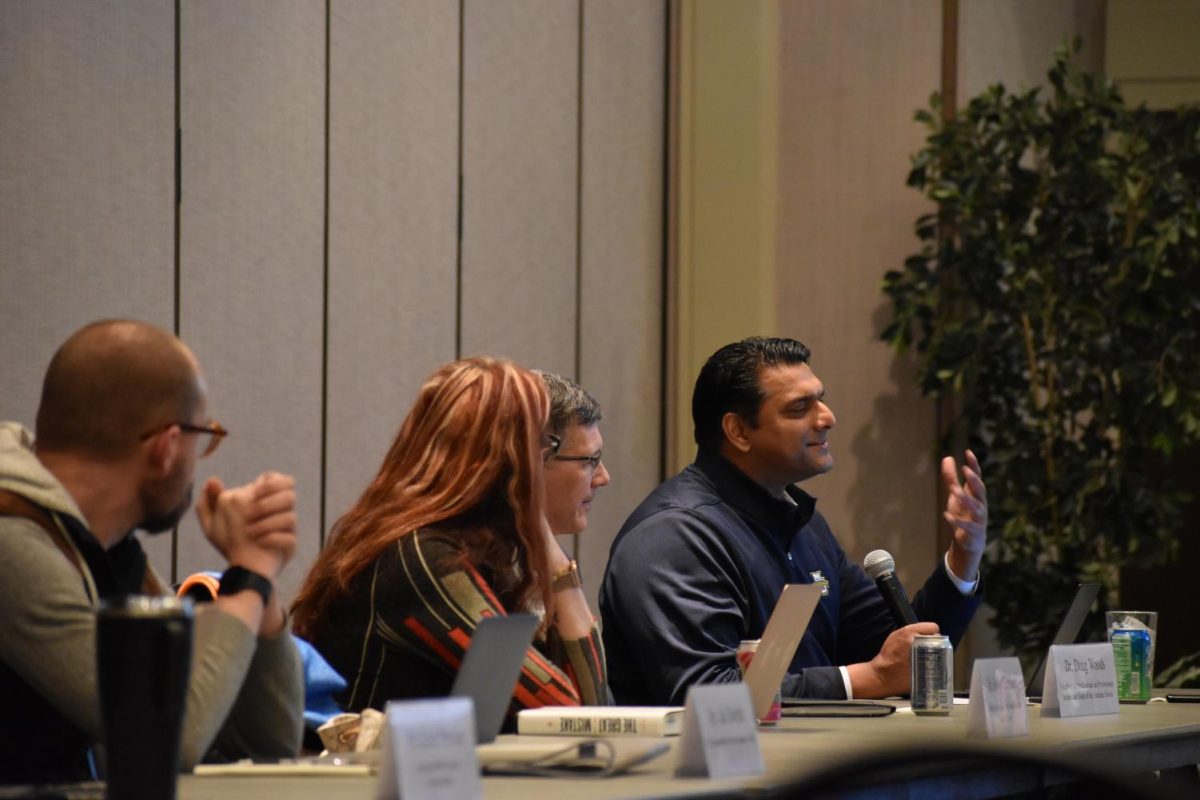 About 50 students gathered at the Alumni Memorial Union Monday afternoon to attend an hour-long student forum held by the Higher Learning Commission. Two members of the commission, Claire Etaugh from Bradley University and Richard A. Redner from the University of Tulsa, asked the students about their experiences at Marquette as part of the reaffirmation of Marquette’s accreditation.
About 50 students gathered at the Alumni Memorial Union Monday afternoon to attend an hour-long student forum held by the Higher Learning Commission. Two members of the commission, Claire Etaugh from Bradley University and Richard A. Redner from the University of Tulsa, asked the students about their experiences at Marquette as part of the reaffirmation of Marquette’s accreditation.
“I wanted to hear feedback from students on subjects such as residence life, relationships with faculty and staff and financial aid,” Redner said.
This event was one of three forums held this week by the Higher Learning Commission. The two others were held for university faculty and staff.
The North Central Association of Colleges and Schools, one of the six regional accrediting bodies in the United States, is in the midst of reviewing Marquette for accreditation this week. The Higher Learning Commission is a member of the NCA and is responsible for validating the degrees granted by Marquette.
As part of the review process, the commission is observing Marquette’s presidential transition.
Redner said he and the team have talked frequently with administrators regarding the changes in leadership with former Provost Pauly.
“We want to see if the university is prepared to handle this transition,” Redner said. “I see myself as a consultant when I write my report.”
MARQUETTE UNDER EXAMINATION
Accreditation by the Higher Learning Commission is an affirmation to the public that Marquette meets the requirements and criteria of the commission and that there is evidence to believe the institution will continue doing so.
The North Central Association of Colleges and Schools and the Higher Learning Commission are federally recognized institutions that design standards for the quality of higher education. Both bodies work with the U.S. Department of Education to assure quality in higher education for students who benefit from federal financial aid programs.
Each higher education institution is required to be re-accredited every 10 years.
The Higher Learning Commission sent a team of eight peer reviewers, distinguished scholars and faculty throughout the North Central region to Marquette this week to observe the university. During the week-long visit, the peer review team met with a multitude of faculty, talked with members of the Board of Trustees, attended multiple classes and observed campus life.
The peer review team is examining the university under the guidelines of five criteria.
The team examined Marquette’s ability to operate to the fulfillment of its mission statement. It also observed how the university allocates its resources and how prepared it is to improve the quality of education, while responding to future challenges and opportunities.
The eight reviewers focused on how Marquette provides evidence of student learning and teaching effectiveness that meets its educational mission, along with observing how Marquette promotes a life of living and learning for all members of the community. The team will specifically observe how the university analyzes its capacity to service students and faculty.
After the team finishes the site visit, it will compile a report of their observations. These documents are reviewed by a readers panel and then sent back to the university so they can correct or amend anything it feels the site team missed. Afterward a decision-making body will take action on the reader’s panel recommendation.
If re-accredited, Marquette may be asked to submit progress reports, monitoring reports, contingency reports or participate in a focus visit.
A BRIEF HISTORY
Marquette has been an accredited university since 1922.
Marquette’s accreditation was most recently reaffirmed by the Higher Learning Commission in 2004. The peer review group, however, required a second focus visit in 2009, specifically to observe ethnic diversity on campus.
In the 2004-2005 academic year, Marquette’s undergraduate population was identified as being 12.5 percent ethnic minority.
Marquette fulfilled the Higher Learning Commission’s mandate for greater ethnic diversity by the time of the focus visit. The 2009-2010 academic year had a 16 percent minority population.
Ethnic diversity continued to rise on campus since the 2009 focus visit. As reported in an earlier Marquette Tribune investigative report, 25 percent of the class of 2017 is an ethnic minority.
RESEARCH ACCREDITATION
Over the past two years, in preparation for the visit from the Higher Learning Commission, Pilarz collaborated with Gary Meyer and Thomas Peters, chair and co-chair of the reaffirmation of accreditation initiative, respectively. Together they designed a 224-page self study.
The document breaks down the ways that Marquette meets and exceeds the expectations of the commission. It also includes a summary of strengths, opportunities and challenges for the university.
One of the goals the university set for itself in the document was to attain a “Very High” Carnegie research classification.
Carnegie classifications are given out by the Carnegie Foundation for the Advancement of Teaching, an independent policy and research center focused on the advancement of teaching and learning. The three categories are Research University/Very High Research Activity, Research University/High Research Activity, and Doctoral Research University. Marquette Currently rates as a doctoral research university, the lowest of the three classifications.
Jeanne Hossenlopp, vice provost for research and dean of the graduate school, said the Carnegie classification has a major effect on Marquette’s graduate program.
“It is important as we try to recruit faculty and students and build our research funding that we be in a Carnegie classification that reflects our focus on research,” Hossenlopp said in an email. “Many of the institutions that we look to as peers are in the High Research Activity category.”
The Carnegie Foundation classifies universities that award 20 or more doctoral degrees.
“These ratings are important for recruiting excellent faculty and students – especially graduate students – to Marquette,” Hossenlopp said. “Our research reputation can impact the ability of faculty to receive competitive external funding for their work.”
Hossenlopp said Carnegie looks at a few things while evaluating research at Marquette. These include research funding from both internal and external sources, the number of doctorates awarded at Marquette and the number of Ph.D-level, non-faculty staff in science and engineering.
Carnegie separates science, technology, engineering and math (STEM) research from non-STEM research in its evaluation, though both contribute to the overall rating. Quality of research is not taken into account.
Hossenlopp said Marquette provides less funding for research than other larger Jesuit institutions, but the university has offered several fellowships and grants to increase research funding on campus.
For example, the Way-Klingler Fellowship offers two fellowships to senior faculty – one that grants $50,000 annually for three years for STEM research, and another that grants $20,000 annually for three years for research in the humanities. Faculty can also apply for summer fellowships that offer grants that supply seed money to support their work.
These fellowships may help the university to achieve the “High Research Activity” classification from Carnegie.
CONCLUSION
Decisions regarding the reaffirmation of Marquette’s accreditation will be made within the academic year. Specific dates are not available.
Kyle Whelton, a senior in the College of Arts & Sciences and legislative vice president for Marquette Student Government, attended the student forum Monday. He said he thinks the event went well.
“Students had an honest, open dialogue about Marquette highlighting a number of things of which they were proud as well as concerns they had,” Whelton said.
Whelton also said he believes the accreditation process is a healthy process for the university.
“It has allowed the entire Marquette community to take an honest look at ourselves and say at what do we excel, where do we meet the standard, and what needs improvement,” he said. “I think we will grow as a university from this process and we will be a better institution because of it.”

